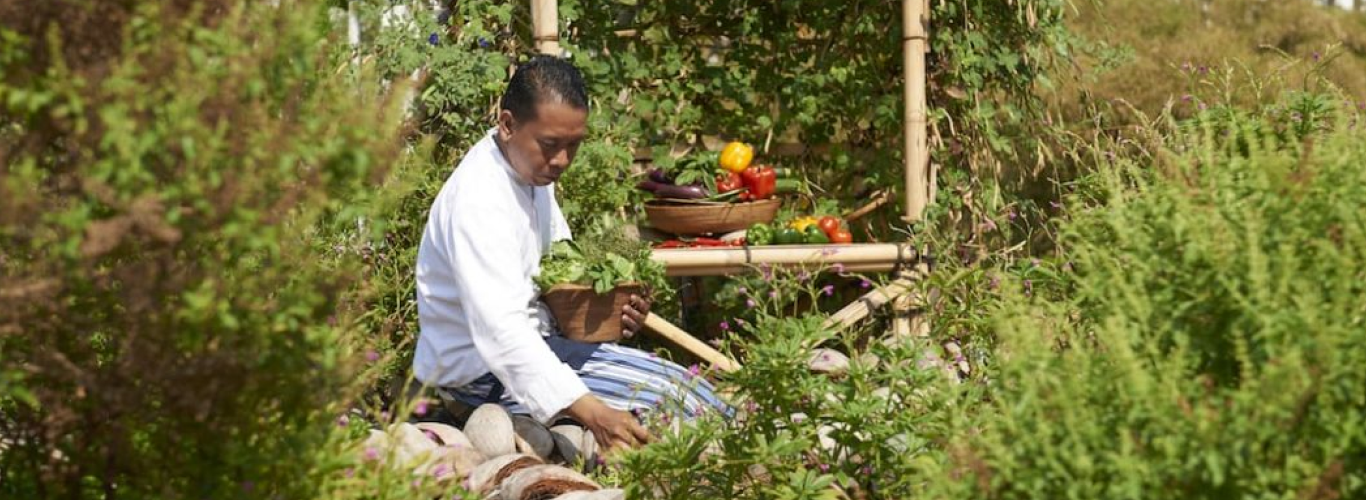
After pledging “zero waste to landfill” over two years ago, Alila Hotels & Resorts has achieved its goal across all four of its Bali properties and plans to take and adapt the model to its other hotels.
“It’s quite complex to actually get yourself to ‘zero waste to landfill’,” said Guy Heywood (COO, Two Roads Hospitality). “Over the years, we’ve built up a reputation for high-end tourism in Bali… but pollution in Bali is a reality.
“In a year of 156,000 rooms available to sell per year, with occupancy of 60-70%, we’ve produced 500 tonnes of waste, and we’re only small properties compared to some of the other big boys.”
Plus, Indonesia is a pretty intense place to start. It’s regarded as the second largest polluter of marine plastics (China is the largest).
To achieve this, Alila Ubud, Alila Manggis, Alila Villas Uluwatu, and Alila Seminyak had to develop creative ways of reducing or repurposing all waste generated by each respective property.
Heywood recounted how during the rainy season (starting around October/November in Bali each year), endless waves of litter wash up onto Bali’s shore and its beachfront hotels must spend a few hours clearing the debris each morning.
“We really need government and big industry to get on board to help us solve this problem, we can’t do it on our own. We still need to think about the part we can all play, what we can do as individuals and as organisations.”

To tackle its own waste problem, Alila Hotels & Resorts launched the ISURRF programme – an Integrated Sustainable Resource Recovery Facility – to find ways to recycle and upcycle its waste.
Inorganic waste is sorted manually from glass to PET plastics, and recycled where possible. Glass, for example, is crushed and used to make building materials, which can be incorporated into the hotel or sold.
The bulk of its waste is fortunately organic produce – 86% of its total – some of which is re-used on the hotel property. The rest is sent out to third parties.
Composting is naturally the simplest solution, however as there is just so much of it, it is impossible to cycle it back into each property. So, Heywood explained, once the waste is composted, a portion of it is used to fertilise the hotel’s gardens, while the rest is sent off to its other properties where there is more land.
For its land-restricted properties, Alila has built rooftop gardens to grow organic fruit, vegetables and herbs to use up its composted waste. The gardens are also used to add an experiential element for guests, as the hotel encourages them to explore its grounds. Alila Ubud, for example, hosts cooking classes that work with ingredients from its gardens.
“We wanted to look at how to turn [waste] into something more valuable,” explained Heywood, like leveraging it to create a new guest experience.
Beyond finding uses for its waste, Alila is also finding better alternatives when it comes to its amenities. It has substituted all plastic straws with bamboo alternatives, and uses re-usable and washable hotel slippers made from recycled tyres. It has also invested in its own water purification system (at Alila Villas Uluwatu).

But beyond Alila, there is great need for all other hotels to adopt similar methods. Making travel brands more accountable for their impact might be one way forward.
“I think [change will] never happen from a governmental point of view, so it’s got to come from us,” said Heywood. He argued that the only way forward is if independent businesses take the initiative to collaborate and set higher standards for sustainable practices.
“The problem in our industry is it’s quite unregulated… but then you’ve got organisations like Earth Check or third parties that can credit you as a business, but it’s not compulsory.”
Heywood drew comparison of wine production and the restrictions around how wine can be labelled, according to a fixed set of rules based on its terroir, grape variety etc.
“The hotel industry could set something like that up, benchmarking and regulating hotels so they can clearly state where you stand as an organisation from an environmental point of view, the same way you do as a five-star, four-star or three-star [hotel].
“I think that’d be a great help in the ability of a traveller to make their decisions. Something like TripAdvisor would be a great independent organisation to get on board with something like this, and start rating hotels.”
Heywood stressed the importance of customer reviews and its direct impact on bookings and therefore the bottom line. It would be a great way, he believes, to apply the right kind of pressure to get hotel owners on board.
Yet, this would come with the caveat that consumers are both conscious of and care enough about a hotel’s sustainability ranking, when they make a booking or plan a holiday.
Fortunately, other hotels at least seem very receptive to adopting similar principles and practices on their properties too, in a collective effort to reduce their impact.
Making organisational changes with the intent to reduce consumption and waste might also yield financial benefit. For hotel property owners with a hawk-eye on ROIs, this might also be a helpful push when crafting comprehensive sustainability initiatives.
Asked if any of the Alila’s schemes have helped to generate any kind of profit, even if marginal, Heywood replied, “it’s not our driving force. Water bottling, to be frank, is financially viable…but at the end of the day, we’ll make our money from rooms, F&B and our core business. This will be so minor that it doesn’t really impact the bottom line.
“If we can get into a position where we break even, or we can show our financial initiatives to an owner, that’s always going to be a good thing.”
© All Rights Reserved | 2023 @ Nigel Grier